Paul Manley Back Pain and RSI Clinic
Paul Manley, M.A.O.(Manip), Registered OsteomyologistFor muscle and joint problems
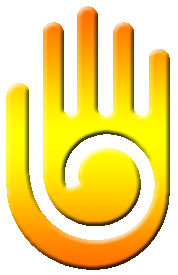
RSM (Royal Society of Medicine)
Specialist in the treatment of Musculo-skeletal problems
Location: 8-10 Boston Place, Marylebone, London NW1 6QH
Next to Marylebone Station, Main line trains and Bakerloo line
19/01/2026
The absolute importance of Circadian Rhythms
Your body clock
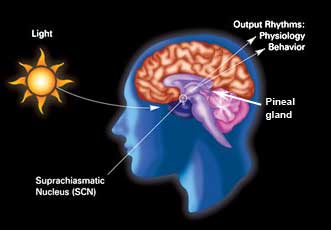
In 1980 I began to follow the then current research on serotonin, tryptophan and melatonin, all connected with the Pineal, activation levels of the cerebral cortex and general repair mechanisms. 'The Biological basis of schizophrenia'
published around 1990 was an eye-opener. It dealt with the disorder, not in a Jungian or psycho-analytical way, but examined, chapter by chapter the control systems that we have in our brains and metabolism which ultimately governed with supremacy, our state and sense of being. Then came Hans Lurias' book The Cyto-architectonics of the Human Cerebral Cortex. This book, with its series of extraordinary experiments (mostly humane) elicited the most incredible complexity of how 'we' are constructed neurologically and what an amazing feat it is that any of us are mobile and sane.
Finally I discovered the classic: 'The Pineal Gland: a symposium' edited by Russell J. Reiter. This book published in the 1990's said it all and more. It even had a chapter called 'The Pineal Gland, an oncostatic mechanism?'. This chapter showed that the first experiments in reversing cancers had begun using Melatonin. Not only that but that there were very strong indications of its usefulness in cancer treatments.
As we speak, the research continues....
It may be that one day this little organ in the middle of our primitive brain will prove to be of central value and perhaps lead to a better understanding of how we perceive ourselves and how best to optimise our health and lives.
The importance of the pineal gland.
A circadian rhythm is an endogenously driven roughly 24-hour cycle in biochemical, physiological, or behavioural processes. Although circadian rhythms are endogenous ("built-in", self-sustained), they are adjusted (entrained) to the environment by external cues called 'zeitgebers', the primary one of which is daylight.
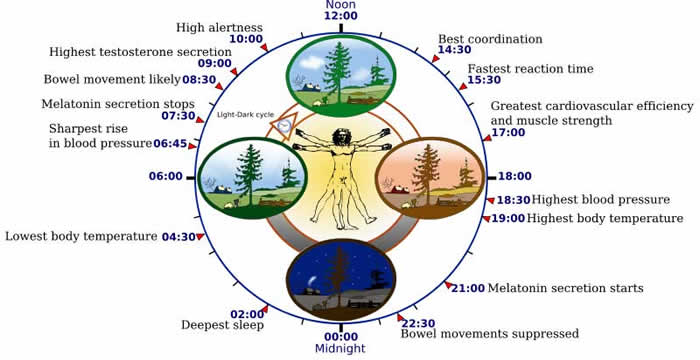
Circadian rhythms are regular changes in mental and physical characteristics that occur in the course of a day (circadian is Latin for "around a day"). Most circadian rhythms are controlled by the body’s biological "clock." This clock, called the suprachiasmatic nucleus or SCN, is actually a pair of pinhead-sized brain structures that together contain about 20,000 neurons. The SCN rests in a part of the brain called the hypothalamus, just above the point where the optic nerves cross. Light that reaches photoreceptors in the retina (a tissue at the back of the eye) creates signals that travel along the optic nerve to the SCN.
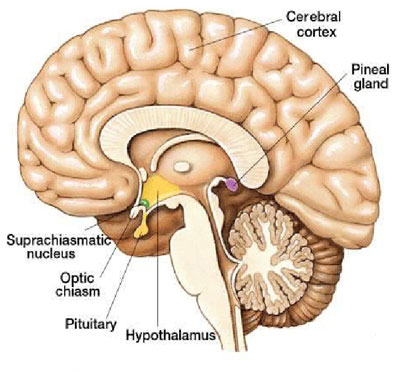
Signals from the SCN travel to several brain regions, including the pineal gland, which responds to light-induced signals by switching off production of the hormone melatonin. The body’s level of melatonin normally increases after darkness falls, making people feel drowsy. The SCN also governs functions that are synchronized with the sleep/wake cycle, including body temperature, hormone secretion, urine production, and changes in blood pressure.
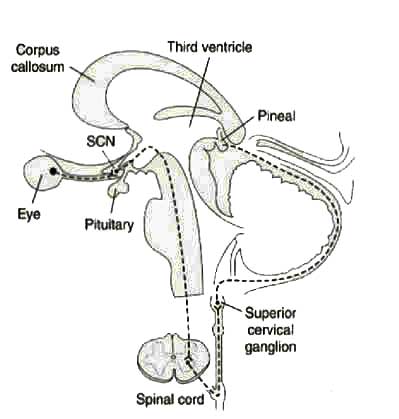
There are many health problems associated with disturbances of the human circadian rhythm, such as seasonal affective disorder (SAD), delayed sleep phase syndrome (DSPS) and other circadian rhythm disorders. Circadian rhythms also play a part in the reticular activating system, which is crucial for maintaining a state of consciousness. In addition, a reversal in the sleep–wake cycle may be a sign or complication of uremia, azotemia or acute renal failure, this is also fairly common in psychiatric disorders.
Rhythms control your day
Almost no area of your body is unaffected by circadian rhythms.
- Sleep and wake--It may seem you sleep when you're tired and wake when you're rested. But your sleep patterns follow a circadian rhythm.
- You're most likely to sleep soundly when your temperature is lowest, in the wee hours of the morning. You're also most likely to awaken when your temperature starts to rise around 6 to 8 a.m.
- As you age, your brain's "pacemaker" loses cells. This changes your circadian rhythms, especially noticeable in how you sleep. You may nap more, have disrupted sleep and awaken earlier.
- Temperature--Your temperature is lowest when you're inactive. And activity can make your temperature rise. But despite these factors, your temperature also follows a definite circadian rhythm.
- In the late afternoon, your temperature can be as much as 2 degrees Fahrenheit higher than in the morning. And it will rise and fall even if you never see daylight.
Hormone production--Almost all hormones are regulated, to some extent, by circadian rhythms. - Cortisol affects many body functions, including metabolism and regulation of your immune system. Its levels are highest between 6 and 8 a.m. and gradually decline throughout the day. If you change your daily sleeping schedule, the peak of cortisol's cycle changes accordingly.
- Growth hormones stimulate growth in children and help maintain muscle and connective tissue in adults. Sleep triggers hormone production, regardless of when you go to bed. Production peaks during the first two hours of sleep. If you're sleep deprived, production drops.
- Cardiovascular system--More strokes and heart attacks occur in the morning than at any other time of day. This makes some people wonder if morning exercise is safe.
- But experts contend morning changes in your body--not exercise-- may be responsible for cardiovascular problems. Blood clots most rapidly at about 8 a.m.
- Blood pressure also rises in the morning and stays elevated until late afternoon. Then it drops off and hits its lowest point during the night.
- These changes occur independently of physical activity. Exercise at any time of the day is beneficial.
- On the other hand, if you're training for athletic competition, you may have reason to schedule that event later in the day. Athletes seem to perform best in the late afternoon, when strength, body temperature and flexibility peak.
- Pain tolerance--Athletes who compete late in the day may perform better because they can "gain" without as much "pain." Pain tolerance is highest in the afternoon. One study shows tooth pain is lowest in the late afternoon, a consideration when you schedule your next dental appointment.
- Medication--Scientists are looking at how circadian rhythms affect the way your body uses medications. One finding is that less anaesthesia is needed to cause analgesia or drowsiness when administered in the afternoon.
- Experiments with cancer medications are trying to find the time of day when the drugs are the most helpful with the fewest side effects.
- Sex --The majority of sexual encounters took place at bedtime (11 pm to 1 am). The most common explanations for this temporal pattern is the biological clock has a time set for sexual arousal.
- Heart attacks--The chances of suffering heart problems are not equal throughout the day. Heart attacks occur more often around 10 o'clock in the morning than any other time, a peak that previously was attributed to daily behaviour patterns getting underway.
Many skin functions are circadian rhythmic.
The proliferation of skin cells varies by up to 30-fold in the 24 hours, being greatest at midnight and least at noon. In women, blood flow, amino acid content and water loss are roughly 25 percent higher at night than morning or afternoon. These rhythms persist in oral contraceptive pill users, although the rate of water loss and blow flow is greater by 10 percent while the content of amino acid is reduced by 35 percent. Oil production by skin glands is twice as great at noon than between 02:00 and 04:00. The skin is more acidic during sleep than around midday and its temperature is higher in the evening than morning. Skin temperature must be about a degree higher at 16:00 compared to 04:00 before sweating begins, although sweat production is greater in the afternoon than morning.
Psoriasis is a chronic inflammatory disease that typically produces a bumpy, flaky condition of the skin especially areas of the scalp, elbows, knees, and back. The cell proliferation rate of the affected skin is much higher than normal skin and shows marked circadian variation. In the epidermis, the cell proliferation rate in areas of psoriasis is highest between 21:00 and 03:00 and least at 09:00. However, in the dermis the rhythm is reversed; cell proliferation is greatest at 09:00 and least at 03:00. The inflammatory activity of psoriasis also varies greatly. It is highest at night and lowest in the morning.
What about blind people?
Some profoundly blind people can "see" after all - although not in the way we traditionally think of vision. Cells at the back of their eyes monitor light levels and use them to set the body's clock to either night or day.
Stay on schedule
Changes in daily habits such as a short night's sleep can disrupt your circadian rhythms. You may be able to stay "in sync" by keeping a consistent daily schedule.
1. Ocular exposure to early morning room light can significantly advance the timing of the human circadian pacemaker. The resetting response to such light has a non-linear relationship to illuminance. The dose-response relationship of the human circadian pacemaker to late evening light of dim to moderate intensity has not been well established.
2. Twenty-three healthy young male and female volunteers took part in a 9 day protocol in which a single experimental light exposure6.5 h in duration was given in the early biological night. The effects of the light exposure on the endogenous circadian phase of the melatonin rhythm and the acute effects of the light exposure on plasma melatonin concentration were calculated.
3. We demonstrate that humans are highly responsive to the phase-delaying effects of light during the early biological night and that both the phase resetting response to light and the acute suppressive effects of light on plasma melatonin follow a logistic dose-response curve, as do many circadian responses to light in mammals.
4. Contrary to expectations, it has been found that half of the maximal phase-delaying response achieved in response to a single episode of evening bright light (~9000 lux (lx)) can be obtained with just over 1 % of this light (dim room light of ~100 lx). The same held true for the acute suppressive effects of light on plasma melatonin concentrations. This indicates that even small changes in ordinary light exposure during the late evening hours can significantly affect both plasma melatonin concentrations and the entrained phase of the human circadian pacemaker.
- Sunlight on an average day ranges from 32 000 to 100 000 lux
- TV studios are lit at about 1 000 lux
- A bright office has about 400 lux of illumination
- At sunset and sunrise, ambient outdoor light is also about 400 lux (if the sky is clear).
- Moonlight represents about 1 lux
- Starlight measures a mere 0.00005 lux
A role for the Pineal in cancer cures?
There is increasing evidence that the pineal gland has a role in the control of neoplastic processes.
According to Cohen, the pineal gland has a role in the etiology of breast cancer. Melatonin inhibits MCF-7 human breast cancer cell growth in culture. In one study of 500 surgically removed breast tumors, 254 were melatonin receptor positive, 246 negative. Most melatonin receptor positive breast cancer occurred between 60-65 years of age, receptor negative breast cancer peaked between 40-45 years. Benign breast tumors were almost invariably melatonin receptor positive. It is proposed that melatonin may have a direct effect on breast tumors, the melatonin receptors being the probable sites of interaction between melatonin and the tumor cell.
Melatonin: Promotes Healthy Sleep Patterns
In numerous studies, Melatonin has been shown to:- Treat insomnia
- Enhance sleep quality
- Fight jet lag symptoms
- Slow the ageing process
- Relieve symptoms of SAD (Seasonal Affective Disorder)
- Decrease ocular pressure
- May prevent Parkinson’s Disease
What is Melatonin and where does it come from?
Melatonin is the hormone responsible for regulating the body’s biological clock. It is produced by the pineal gland, which is located in the brain. Melatonin helps to regulate sleep. During daylight, the pineal gland in the brain produces the neurotransmitter serotonin, but at night, the pineal gland stops producing serotonin and instead makes melatonin. This melatonin release helps trigger sleep.
Why take Melatonin?
- Insomnia: The ability to fall asleep and stay asleep may get a boost from melatonin supplementation. Some studies of young and elderly adults have shown that taking a small amount of melatonin before bedtime helps to both hasten sleep and improve its quality. These benefits were seen in insomniacs as well as in individuals who struggle with only occasional sleep problems.
- Sleep problems caused by pain or stress: Frequent night-time awakenings can occur as a result of chronic pain or stress. In such situations, melatonin may help by encouraging sounder slumber.
- Jet lag: If you're working a night shift or are traveling across time zones, melatonin supplements may help your body to overcome any disorientation and quickly reestablish a normal sleep pattern. Recent studies of airline personnel and others who travel long distances found that melatonin supplements significantly relieved jet lag symptoms. This was true regardless of whether they were flying eastbound or westbound. However, not all studies have found melatonin to be superior to a placebo for such jet lag symptoms as fatigue, daytime sleepiness and impaired alertness.
- Anti-Ageing: Animal research indicates that melatonin may be of value in extending life--elderly mice administered the supplement lived 25% longer than their cohorts in one study--although much more investigation is needed before firm conclusions can be made about its value for humans in this regard. Melatonin's antioxidant properties may help to stave off illnesses commonly related to ageing, such as heart disease and cataracts. The hormone may boost immune-system function as well, which can weaken with age.
- SAD-related depression: A number of people who feel quite normal and energetic in summer become depressed and sluggish in winter, when sunlight is weaker and less abundant. Low melatonin levels may also be present in individuals who react in this way. According to a handful of preliminary studies, such individuals are said to be suffering from SAD (seasonal affective disorder) and may experience a significant improvement in mood if they take several tiny doses (0.1 mg) of melatonin in the afternoon. Study participants who failed to improve took either a large single dose in the morning or no melatonin at all. More studies are needed in this area.
- Ocular Pressure: Taken in small amounts, Melatonin has been
shown to lower pressure in the eyes. Since studies have only been done on healthy eyes, it is uncertain whether melatonin would be an effective treatment for glaucoma. - Parkinson’s Disease: Low melatonin levels may cause the failure of
neurotransmitters, leading to Parkinson’s Disease. Supplementation may
prevent this from occurring. - Present ideas suggest a positive involvement of melatonin in affective disorders, possible involvement in the schizophrenic psychosis, and potential involvement of this hormone in other psychiatric categories.
Who needs it and what are the symptoms of deficiency?
It is largely thought that as people age, their bodies produce less melatonin. Deficiencies can lead to insomnia. The production of melatonin varies according to the amount of light you're exposed to; more melatonin is produced at night than during the day, and your body produces more melatonin in a completely dark room than in a dimly lit one.
Stress, illness, and ageing are the culprits that can speed up this deficiency in Melatonin. Recent research has shown that Melatonin is one of the most powerful antioxidants. The problem of insomnia is helped significantly with Melatonin intake. Most people report a calm deep sleep; some report more dreams and also a good nights rest.
How much should be taken? Are there any side effects?
Melatonin researchers themselves have yet to determine the optimum doses for various users. Individual needs vary considerably depending on differences in metabolism. For purposes of sleep, larger doses are not necessarily more effective than smaller doses. (If you feel groggy the next morning, the dose you have taken was too high; if you do not experience a deep restful sleep, your dose may have been too low). Research findings indicate that the lowest potency of melatonin can usually induce natural sleep patterns or help us to cope with jet lag. However, they determined that the highest potencies are needed by seniors 65 years of age and older.
Are there foods which boost Melatonin levels?
Serotonin has come under a lot of attention recently because research has shown that low levels of this neurotransmitter can lead to increased incidences of aggressive behaviour and increased symptoms of anxiety and depression. Even more worryingly is that it has been found that lower serotonin function and impulsive/aggressive traits are associated with suicide.
The amino acid Tryptophan is present in most proteins that we eat. This amino acid combines to make molecules of serotonin. serotonin, under the influence of the Pineal gland is turned into Melatonin.
Foods which contain and or stimulate serotonin production:
-
Free Range Turkey
-
Pineapple
-
Bananas
-
Dark Chocolate
-
Flaxseed/ Flaxseed oil
-
Wild Fish and Sea food
-
High quality Eggs
-
Sour Cherries
-
Free Range Beef
Don't forget: early to bed and early to rise makes you healthy, wealthy and wise.
07925 616 753
Location: 8-10 Boston Place, Marylebone, London NW1 6QH
Next to Marylebone Station, Main line trains and Bakerloo line
